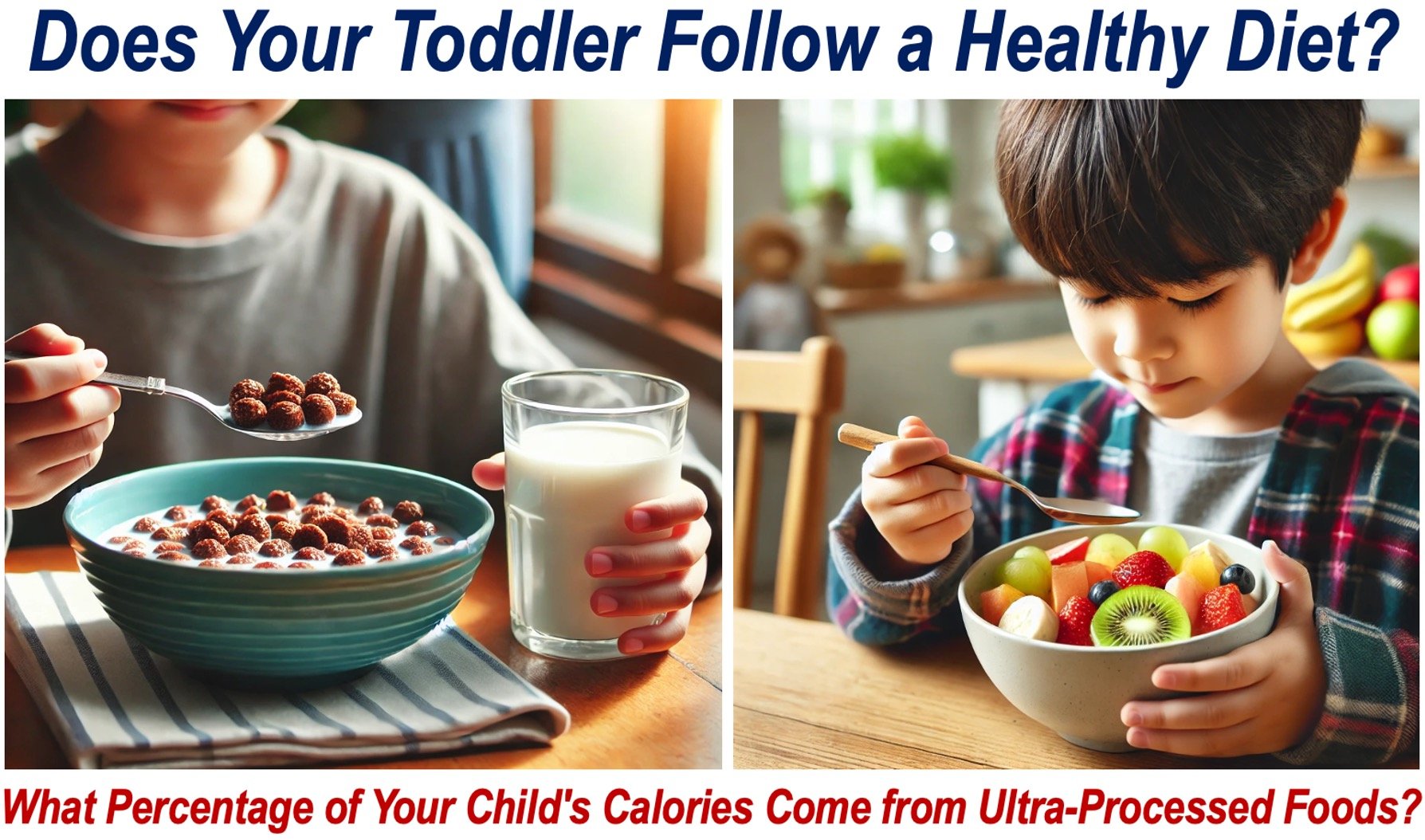A growing reliance on ultra-processed foods raises concerns about long-term dietary habits and health outcomes in children.
A recent study led by UCL researchers has revealed that nearly half of toddlers’ daily caloric intake in the UK comes from ultra-processed foods (UPFs). ‘UCL stands’ for ‘University College London’.
As children grow, their consumption of these highly processed products increases, raising concerns about the potential health impacts and the establishment of unhealthy eating patterns that may persist into adulthood.
Ultra-Processed Foods in Early Childhood
The study, published in the European Journal of Nutrition (citation below), examined the diets of 2,591 children born in the UK between 2007 and 2008.
The research revealed that toddlers, at the age of 21 months, obtained 47% of their total calorie intake from UPFs.
These foods include items such as flavored yogurts and wholegrain breakfast cereals, often perceived as healthy but frequently containing high amounts of added sugar and salt.

By the time these children reached the age of seven, their consumption of UPFs had increased to 59%.
At this age, sweet cereals, white bread, and puddings became the most commonly consumed UPFs, replacing the so-called healthier options from their toddler years.
-
Healthier Options
Examples of healthier options include whole fruits, vegetables, minimally processed oats, and natural yogurt without added sugars or artificial ingredients. These options provide essential nutrients with fewer additives.
Nutritional Concerns
Dr. Rana Conway, the study’s lead author and a senior research fellow at the UCL Institute of Epidemiology & Health Care, highlighted that not all ultra-processed foods are inherently unhealthy.
However, many of the UPFs commonly consumed by toddlers contain excessive amounts of sugar and salt.
This dietary pattern is worrisome, particularly given that young children already tend to consume more sugar and salt than recommended.
A key concern is that early exposure to UPFs may deter children from appreciating the natural flavors of whole foods, potentially shaping less healthy eating habits in the future.
Senior author Professor Clare Llewellyn emphasized the importance of early eating patterns, as they often persist into later childhood and adulthood.
Findings from the Study
The study’s data, drawn from the Gemini twin cohort study, revealed that toddlers with higher UPF consumption at 21 months were more likely to continue consuming high levels of these foods by the age of seven.
Children in the highest UPF intake group at 21 months were 9.4 times more likely to remain in the highest UPF-consuming group at age seven.
The research also showed that toddlers in the lowest UPF consumption group derived 28% of their calories from these foods, while those in the highest group consumed a significant 69% of their calories from UPFs.
Nutritional Impact of Ultra-Processed Foods
Across all UPF consumption groups, children’s intake of free sugars exceeded the UK government’s recommended maximum of 5% of daily calories.
In the highest UPF-consuming groups, added sugar intake exceeded 10% of daily calorie intake, double the recommended limit.
In addition to concerns about sugar, the study found that children consuming higher amounts of UPFs also had higher intakes of sodium (salt).
This suggests that children consuming more UPFs may be exposed to a diet that is high in fat, sugar, and salt, all of which are linked to various long-term health issues.
The Need for Policy Changes
The study calls for urgent policy interventions to reduce UPF consumption among children.
This could include restricting the marketing of unhealthy foods aimed at children, introducing clearer labeling for products high in sugar or salt, and providing subsidies for healthier, minimally processed foods.
Dr. Conway acknowledged the challenges parents face in feeding their children healthily in today’s food environment.
Ultra-processed foods are often cheaper than healthier alternatives like fresh fruits and vegetables, making it difficult for parents to make healthier choices.
Additionally, products marketed as healthy for children, such as some yogurts and cereals, may still contain high levels of sugar and salt, complicating the decision-making process for parents.
Three Main Types of Foods
Foods can be categorized into three main types: unprocessed or minimally processed foods, processed foods, and ultra-processed foods.
-
Unprocessed or Minimally Processed Foods
This type includes natural items such as fruits, vegetables, eggs, and whole grains, which have undergone little to no processing. These foods retain their original nutrients and are the healthiest options.
-
Processed Foods
Processed foods undergo some level of modification, such as canning, cooking, or preservation. Examples include tinned fish, cheese, and peanut butter. These foods often contain added ingredients like salt or sugar to extend shelf life or enhance flavor.
-
Ultra-processed foods (UPFs)
UPFs are highly altered, containing additives like emulsifiers, sweeteners, and artificial colorings. Products such as sugary cereals, packaged snacks, and sodas fall into this category and are typically higher in fats, sugars, and salts, making them less healthy.
Final Thoughts
The findings from this research provide a stark reminder of the growing reliance on ultra-processed foods in the diets of young children.
As UPF consumption continues to rise, especially among toddlers and young children, there is an urgent need for effective policies to promote healthier eating patterns.
Encouraging children to consume more whole and minimally processed foods could lead to healthier long-term habits and better health outcomes.
Citation
Conway, R.E., Heuchan, G.N., Heggie, L., Rauber, F., Lowry, N., Hallen, H., & Llewellyn, C.H. (2024). Ultra-processed food intake in toddlerhood and mid-childhood in the UK: cross sectional and longitudinal perspectives. European Journal of Nutrition. https://doi.org/10.1007/s00394-024-03496-7
